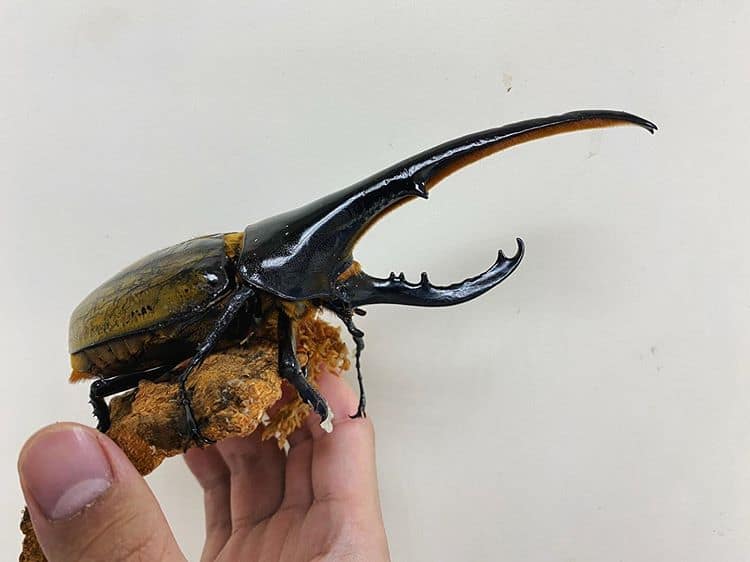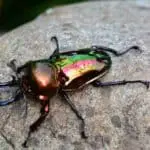The popularity of insect keeping has increased over the past few years. Before you start your insect keeping journey, there are a few things that you must know.
Potential Objections from Family
I bet you can imagine my wife’s reaction when I told her about keeping roaches at home. The immediate answer is a no. If you are living with your family or loved one, most probably you will get the same reaction.

Many people are not afraid of insects, for as long as the insects don’t fly around them, or don’t land on them. If the objections are from people belonging to this group, you should do your homework on the containment method.
Assure your family members that your insect will never escape from their housing. Tell them what are the measures that you will put in place to prevent escape. Promise them to keep your insects somewhere discreet to them. It may take time, but this usually works.
You might have parents or loved one that don’t allow you to keep insects even though they are not really afraid of insects. Often, this is because insects have been demonized and associated with disgust, danger (bite/sting), and diseases. Such perceptive could have been inculcated since they are young and it is not easy to change that.
Similarly, do your homework. Get your facts right so that you can correct them. Talk nicely and don’t overdo it even if you are completely right. People need time to change their perception.
A very small group of people are extremely scared of insects. The presence of insects alone can invoke excessive and irrational fear in these people. This is what we call entomophobia – phobia on insects. If someone in your family or your loved one has entomophobia, you should give up keeping insects unless you plan to move out.
Is it Legal to Keep Insect as Pets?
In many countries, it is legal to keep insects as pets for as long as the particular insect is not considered as pests with agricultural or medical importance. Some countries don’t even have any regulations on this matter.
In the US, plant pests are defined and regulated by the Animal and Plant Health Inspection Service, U.S. Department of Agriculture. You cannot keep, breed, transport across states, and import/export the regulated pest without a permit. This is to protect the agricultural industry as well as the ecosystem. You may refer to the full list of insects regulated by USDA here.
If you really want to keep an insect which is regulated by the USDA, you can apply for the Plant Protection and Quarantine (PPQ) 526 permits. While the application is free, the requirement is quite stringent. It includes the provision of proper containment measures as well as inspections by the authority from time to time. The permit is valid for 3 years and can be reapplied.
As a general rule of thumb, if the insect that you want to keep doesn’t feed on plants and can be found in your state, you can safely keep it in your state without a permit. Always check with the USDA if you are not sure. Do bear in mind, though, states may have another set of regulations on insect keeping that you need to comply with.
Pest Management Regime May Kill Your Insects
Many people engage pest management professionals in the summer to get rid of annoying pests. Unfortunately, your pet insects are equally susceptible to pesticides as the pests.
Let your service provider know that you have pet insects in your house before the treatment is carried out so that they can be cautious when carrying out the treatment. They might also give you instructions that can keep your pet insects safe during the treatment.
If the pest control treatment carried out by your service provider covers only baiting and residual spraying (where they spray onto the surface instead of spraying into the air), it is quite safe for your insect. But if the treatment involves space spraying or fumigation, there is a high chance of killing your insects.
Keep your insects somewhere safe when your pest management service provider is carrying out space treatment. In space treatment, the pesticide stays in the air for some time, and may enter the housing of your insect through the vents. You can put your insects temporarily in your car, garage or places that are not going to be treated.
After the space treatment, you should ventilate your house for 30-60 minutes before putting back your insects. If your plants are treated with pesticides, don’t feed them to your pet insects.
Pet Insects do not Develop Affection for You
Unlike pet dogs and pet cats, your pet insects do not and will never develop affection for you, no matter how much you tender them.
Insects do not have emotions, or at least we don’t understand their emotions at all. Aside from their important role in the ecosystem and inspiration to humans, they live only to survive and pass on their genes. They don’t really care about relations.
If you intend to keep insects as pets, you need to accept the fact that you can’t cuddle your pet insects. They don’t roll when you rub their belly, they don’t lick you, they don’t lean on you and they don’t rub you with their nose or cheeks.
Similarly, it is unlikely that you will grow affection for your insect. I am not sure why. Probably it’s just because we can’t feel or understand their emotions.
Allergy to Insects
Some people are allergic to insects, just like how other people are allergic to peanuts. Allergic reactions can develop by touching the insects, breathing in the debris of insects, or being stung by the insects.

You won’t usually know whether you are allergic to insects until you come into contact with them. I didn’t know I was allergic to roaches until I let them walk on my arm, which causes some rashes and itch on my arm. Washing my arm with soap seems to help shorten the duration of allergic reactions. Since then, I always wear gloves when handling roaches.
Aside from rashes and itch, other allergic reactions include swollen eyes, asthma, scratching throats, sneezing, and running nose etc. Wearing gloves and/or a face mask when handling your pet insects and washing your hands after handling them can reduce the chance and severity of allergic reactions.
Insects may also cause anaphylaxis, or life-threatening allergy through their stings. While this is rare in pet insects, just keep this in mind if you plan to rear stinging insects.
Possibility of Bitten or Stung by Pet Insects
Insects do not bite or sting you because they like to, unless they do that for a living (eg. bed bugs). While any insects with chewing mouthparts can bite, and those with stinger can sting, they do it only to defend themselves.
Even though some of the bites or stings can be extremely painful and may even draw blood, most of them cause light pain and negligible wound. You need to be forgiving when dealing with this, because it is the insects’ instinct to protect themselves from “threats”.
You can reduce the risk of injury by wearing a pair of gloves when handling the insects. As you handle them more, you will learn how not to get bitten/stung.
Can You Keep Exotic Species?

Yes, you can keep exotic species if you are willing to go through the hassle. Exotic species are more difficult to source for and more expensive to buy and maintain. Most importantly, you need to be a responsible owner!
Everyone wants to be different and stands out from the rest. That’s part of the reasons why people want to keep exotic species.
Getting exotic species can be quite difficult. In many countries, you need a permit to import exotic species. Even if you can buy them locally from importers, they often come with hefty price tags.
If you are keeping a tropical insect in a temperate region, you will need to provide extra heat to your insect. Conversely, if you are keeping a temperate insect in a tropical region, you need to put them in a cooler environment. In both situations, you need to invest more money to buy a heat mat or chiller, and pay for your electricity bill to operate them.
Putting legal concerns aside, if you plan to keep exotic species, make sure you are a responsible owner. Put in enough efforts to prevent the insects from escaping to nature and never release the exotic insects to the wild. There are too many cases of exotic species causing harm to the ecosystem by displacing the local species, because there is no natural enemy in the new environment.
Should You Keep Endangered Species?
You should not keep endangered species as pets if it is collected from the wild because this will drive their extinction even faster. However, keeping captive bred endangered species may help to preserve the species from extinction.
A good example is the satanas beetles. This beetle is native to the forests in Bolivia. The male beetles have 2 large horns and are sought after by many hobbyists and collectors because of their rarity. While the existence of satanas beetles are threatened mainly by deforestation, demand from collectors has encouraged hunting of satanas beetles, which could make the species extinct even faster if it is not controlled.
Many countries around the world have formed an agreement called the Convention on International Trade in Endangered Species of Wild Fauna and Flora (CITES) to curb trades of organisms that may threaten their survival.
Species listed in appendix I are those considered threatened; Appendix II consist of species that might not be threatened, but their tradings are controlled; while Appendix III listed species that are protected by at least 1 country with its trading being controlled. You should always consider keeping pets that are not in any of the appendices.
Having said that, there are views that keeping captive bred endangered species can help to preserve them. For instance, aquarium hobbyists have saved 30 fish species from extinction by keeping them at home even though those fish are no longer found in the wild.
If you really want to keep endangered species, always get those captive-bred but not wild caught insects.
Life Expectancy of Pet Insects
In general, insects have very short lifespan. Some may live for a week or 2, and not many live for more than 1 a year. Hence, don’t expect your pet insect to grow up with your kid like how a puppy or kitten would.
Last Words
Now that you have known what you didn’t know, you can assess if it is a GO or NO GO for you to keep pet insects. If it is a GO, great! Welcome to one of the coolest hobbies! In case you need help to choose the right pet insects, check out this guide here.


